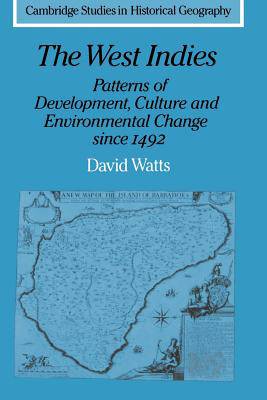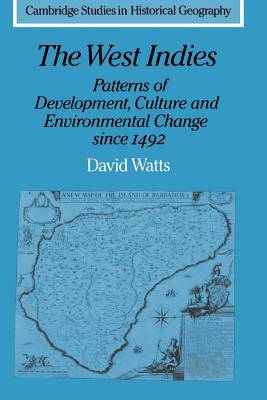
- Afhalen na 1 uur in een winkel met voorraad
- Gratis thuislevering in België vanaf € 30
- Ruim aanbod met 7 miljoen producten
- Afhalen na 1 uur in een winkel met voorraad
- Gratis thuislevering in België vanaf € 30
- Ruim aanbod met 7 miljoen producten
Zoeken
The West Indies
Patterns of Development, Culture and Environmental Change Since 1492
David Watts, Watts David
€ 103,95
+ 207 punten
Omschrijving
This magisterial survey of the historical geography of the West Indies is at bottom concerned with the causes and consequences of three complex and inter-related phenomena: the rapid and total removal of a large aboriginal population; the development of plantation agriculture and the arrival of enforced labour, in the form of many thousands of African slaves; and the environmental, ecological and cultural changes that resulted. Dr Watts shows how the initial European vision of a land of plenty has been replaced by an awareness of the geographic and ecological fragiliaty of the area, and explains how the exploitative agricultural systems of the colonial and recent West Indies have not adjusted to the demands of the environment. An enormous array of historical, biological and literary sources are marshalled in support of Dr Watts' analysis, which is likely to remain the standard work on the subject for many years to come.
Specificaties
Betrokkenen
- Auteur(s):
- Uitgeverij:
Inhoud
- Aantal bladzijden:
- 640
- Taal:
- Engels
- Reeks:
- Reeksnummer:
- nr. 8
Eigenschappen
- Productcode (EAN):
- 9780521386517
- Verschijningsdatum:
- 31/08/1990
- Uitvoering:
- Paperback
- Formaat:
- Trade paperback (VS)
- Afmetingen:
- 152 mm x 227 mm
- Gewicht:
- 1011 g

Alleen bij Standaard Boekhandel
+ 207 punten op je klantenkaart van Standaard Boekhandel
Beoordelingen
We publiceren alleen reviews die voldoen aan de voorwaarden voor reviews. Bekijk onze voorwaarden voor reviews.











